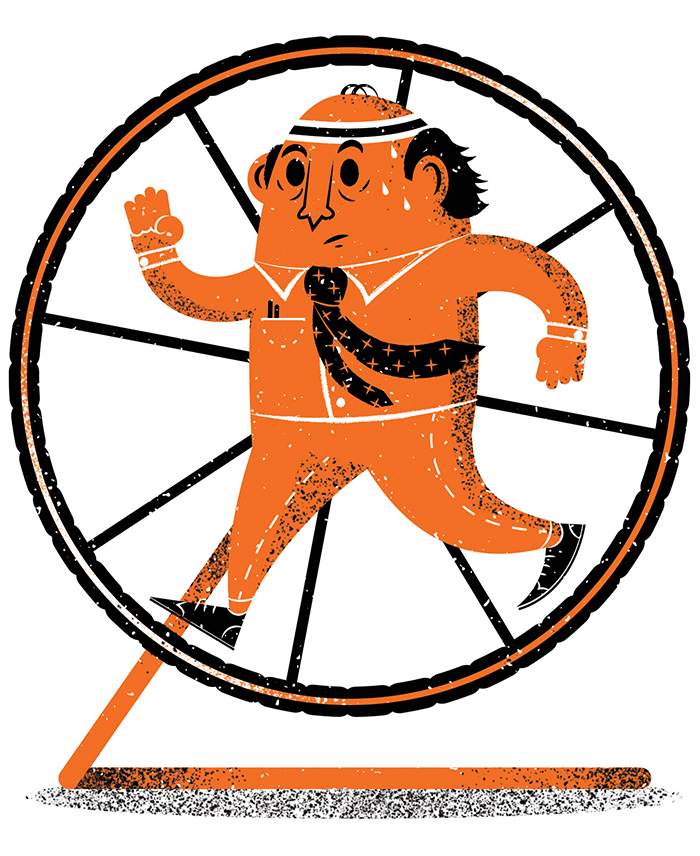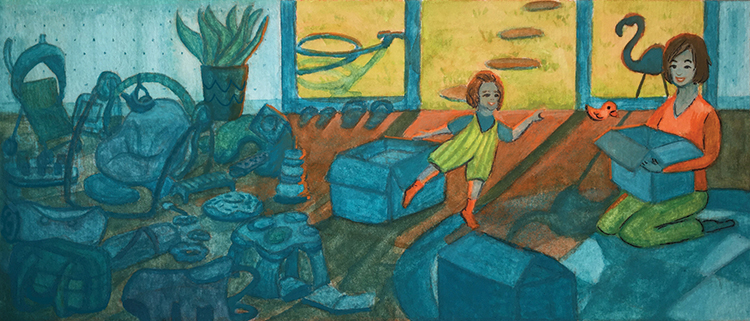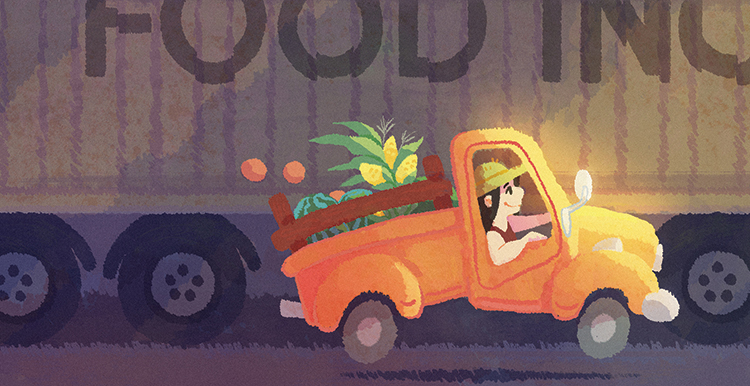Illustration by James Olstein
Running in Circle
interview by Heather Shayne Blakeslee
For the last few decades, scholar and author Juliet Schor has been studying Americans: the way that we work, play and spend. She’s made her life’s work of understanding the economic and cultural forces that mold us—as well as what makes us happy, and what doesn’t—in seminal books like The Overworked American, The Overspent American and Born to Buy. In her book Plenitude, and through her foundational work at the Center for a New American Dream, she has been a proponent of slowing down and examining what is important to us—as individuals, as families, and as a country—all as a means to help us live our values, realize our potential and, hopefully, save our planet.
Many people in America and elsewhere are finding themselves on a hamster wheel of work, spending, debt, stress, more work. It’s not making us any happier, and, as you’ve pointed out, it’s also killing the planet. So, why are we still doing it?
JS: We get trapped in this cycle of work and spend in large part because of the nature of jobs. So, when people take jobs, they don’t have much choice about hours. … The basic argument is that employers set the hours of jobs and the people who want the jobs have to go along with it. … There is income that goes along with that, and people spend it. Basically, Americans… aren’t doing too much saving, so we tend to spend what we get—except for the people higher, closer up to the top of the distribution. …
Now, there’s another important aspect as to why we’re in the hamster wheel, and that is that consumption is a higher social activity. … The system is generating more for people, people are spending it, so lifestyles and consumption habits are getting more and more expensive. A kind of “upscaling” of lifestyle goes on, and people have to sort of work more to earn the money to keep up with the ratcheting-up of lifestyles.
So, there’s kind of a defensive component to it, because it’s important for people to not fall behind: Staying in whatever income group, or social reference group, as we call it… is really important to people. We’re very social animals.
It’s gotten much, much worse because the income distribution has gotten so much worse. The top one percent is taking all of the gains. Incomes are stagnating, but the kind of aspirational consumption is still going up. … So, it’s a complicated process with those three big dimensions.
Do Americans have a specific, or different, relationship with time and money than other cultures?
JS: Well, we used to be more like other wealthy countries. So, from about the 1870s until after the second World War, the U.S. was the international leader in work/time reduction. It’s hard to believe at the moment, but we’re the first ones that got Saturdays off and a number of other landmark reforms in terms of working hours. …
Our path of reducing work hours through productivity growth stopped, and we kind of plateaued for a while, and then in the 1970s we started getting increases in working hours. … So, we now have quite high working hours compared to other wealthy countries. In the neighborhood of 300 – 400 more hours a year than in a place like Germany, another very wealthy country, or France, and some of the other European countries. …
I don’t see it as a primarily deep cultural difference in the way that some people argue. Some people say, “Oh, it’s the Puritan work ethic” or “Americans work so hard.” Actually, I think the more important thing has been the growth of inequality. There’s some really good research showing that more unequal countries have longer hours of work.
When Sheryl Sandberg’s Lean In came out, my personal reaction to it was, “Lean into what?” Even if I was a super, super ambitious person, I’m not going to go work for a big company that pollutes the environment, and I don’t really want a seat at that table. I want to be at a smaller table that’s more aligned with my values. But if all of us do that, do we lose the ability to change the larger game if people are opting out?
JS: I don’t think so. Actually, the more opt-out there is, the more opting-out is a good option, [and] the more the core economy [must] respond. Because it means that people have an alternative.
When that is all there is, people are much less likely to resist the things in that world that they don’t like, whether it’s excessive working hours, too much stress, abusive bosses, lack of meaning in a corporate culture, corporate malfeasance—any of those things.
When you have a good alternative, you can go. We’ve seen, for example, in certain professions—accounting is a certain well-known one—[where there is an] exodus of women on account of the inability to combine work and family, which led that profession to change, and to become much more flexible for people who wanted reasonable work schedules. So, I think the presence of an option is one of the most powerful levers for change.
Talk a little bit about the Center for a New American Dream, and their mission of raising awareness about the downside to hyper-consumer culture and giving people resources on conscious consuming and green living.
JS: In the early ’90s, a number of us who worked on consumer issues had begun talking about the fact that almost no one in the environmental movement was addressing consumption.
It was a very production- and policy-oriented movement, which is fine; those are the really key things. But we believe there’s also a role for households and changes in consumer culture and that, ultimately, you were going to have to have changes in consumer culture to have a sustainable economy and society. …
At that time, [I] was working on the question we had just been talking about: that sort of excessive busyness, and the work-and-spend cycle and what that was doing to people and our culture. So, we came together and founded a group that was oriented to raising questions about how we were living, and we sort of had the motto of “more fun, less stuff.” Kind of quality of life over quantity of stuff. And that has been a really important theme.
Since that time, there has been a tremendous amount of social science research on the question of what provides quality of life. [It supported] the approach we were taking, which was to say, just giving people more money and more stuff is not the root to happiness, well-being, life satisfaction. Other things matter a lot more.
We have a campaign, a few years after we were founded, which was called More of What Really Matters and asking people, “What really matters?” And the answer to that is more time, more nature. But that meant more sustainability, attention to the planet. More community, more fairness. We were really focused on doing this in a way that was bringing people together, reducing inequality, ensuring that the goods that we purchased are not made with slave labor, exploited labor. We really wanted to inject a conversation about consumption into the environmental movement. …
It wasn’t just because of us, but, 10, 15 years after we started, all of the major environmental groups were finally talking about how people live. It became a really central part of the sustainability discourse. Since then, we’ve moved on to a place where it’s not just about individuals, individual behavior change—which is an important thing—but we’re doing a lot more around organizing community. We believe that, particularly with the kinds of changes that are going to come from global warming and climate chaos, it’s really important for us to come together as a community: to build re
silience, to build equity, to build an engaged citizenry.
Juliet Schor is a professor of sociology at Boston College.








